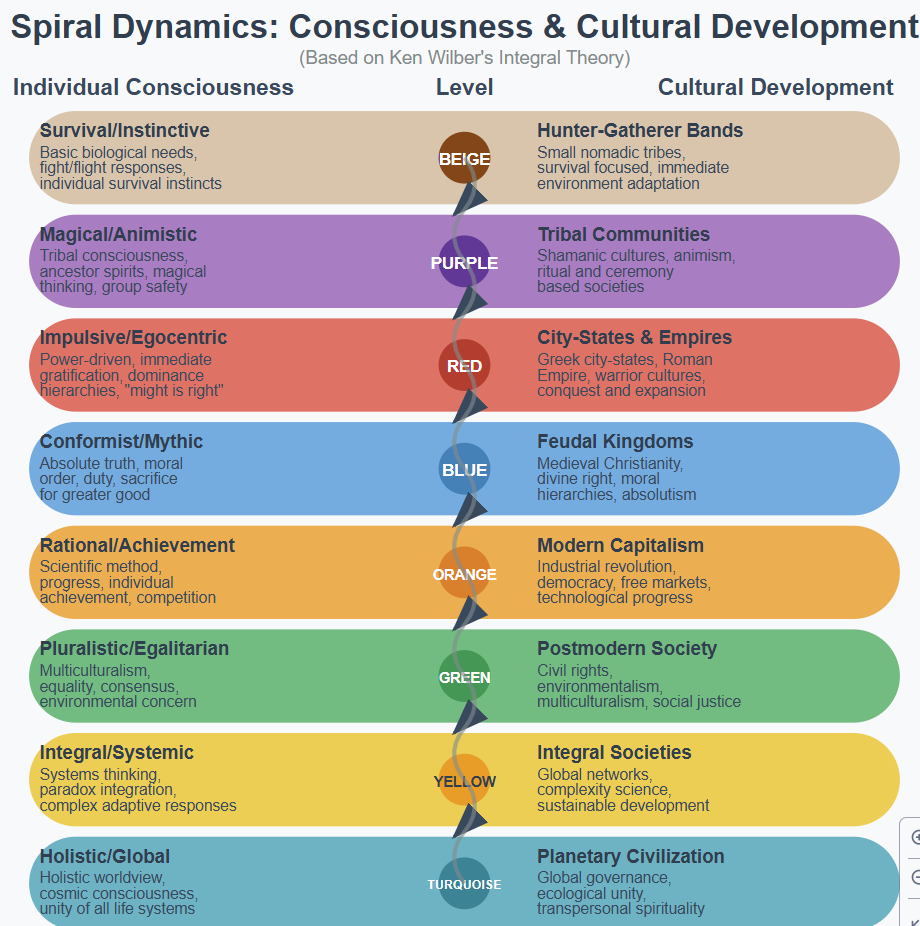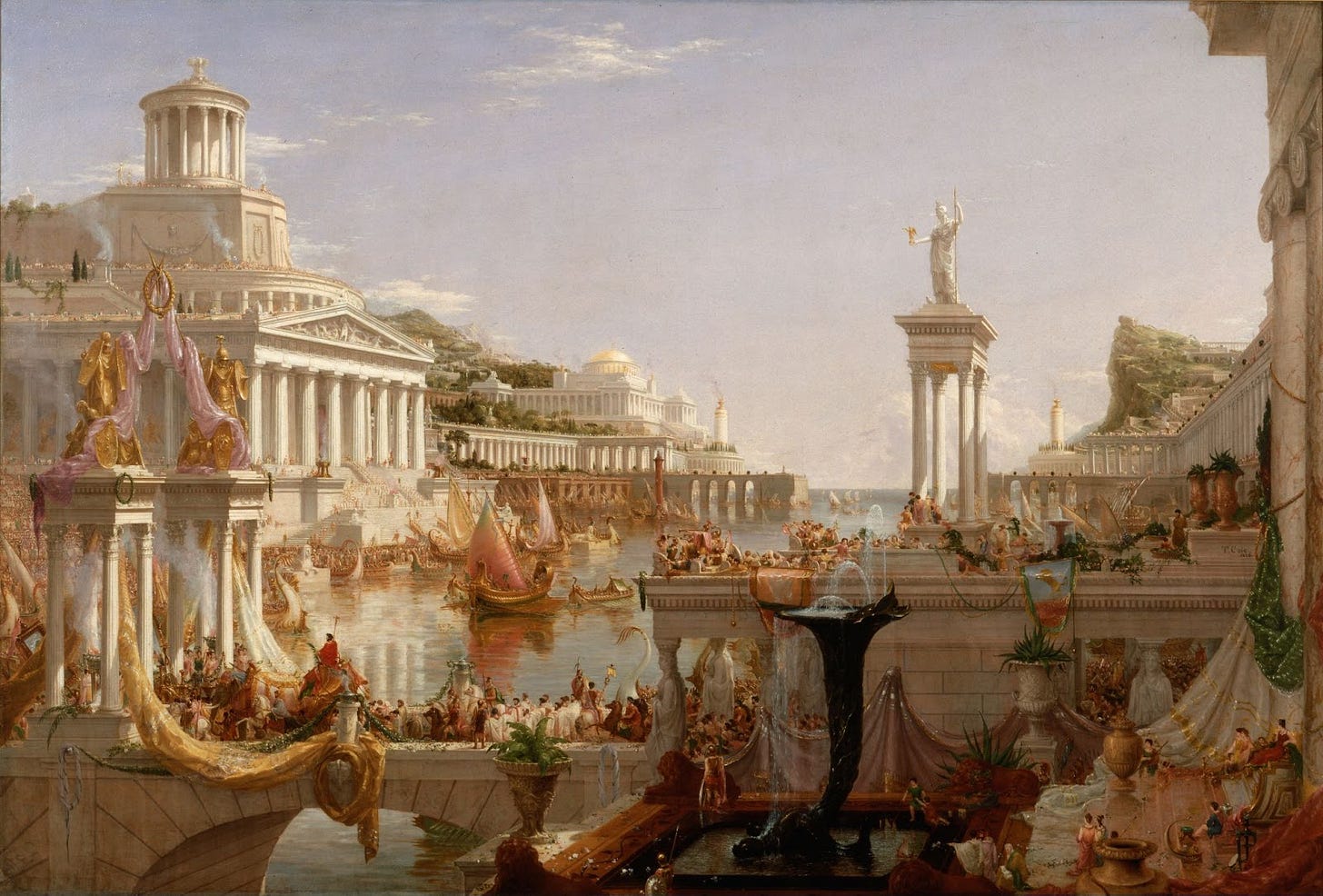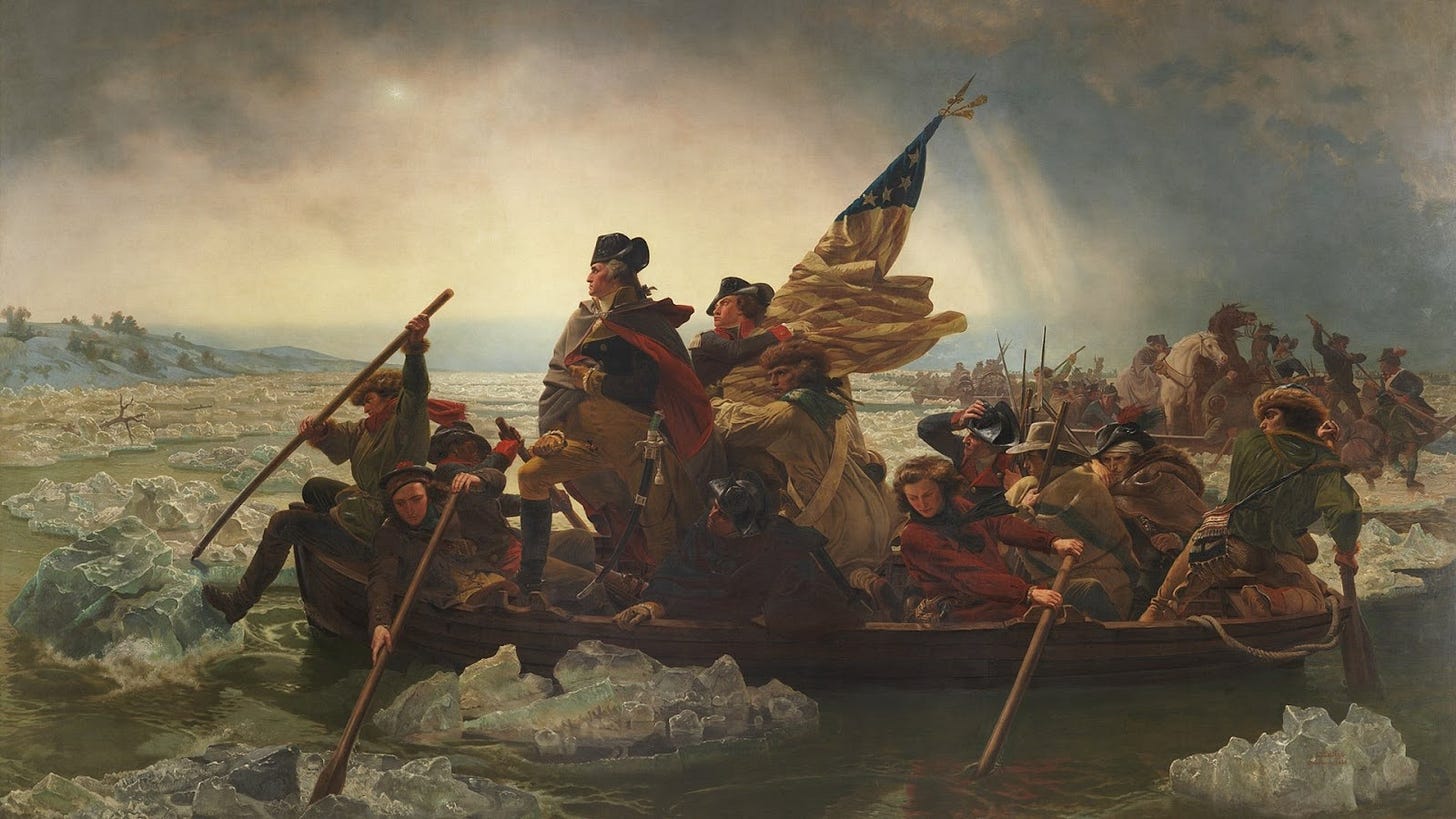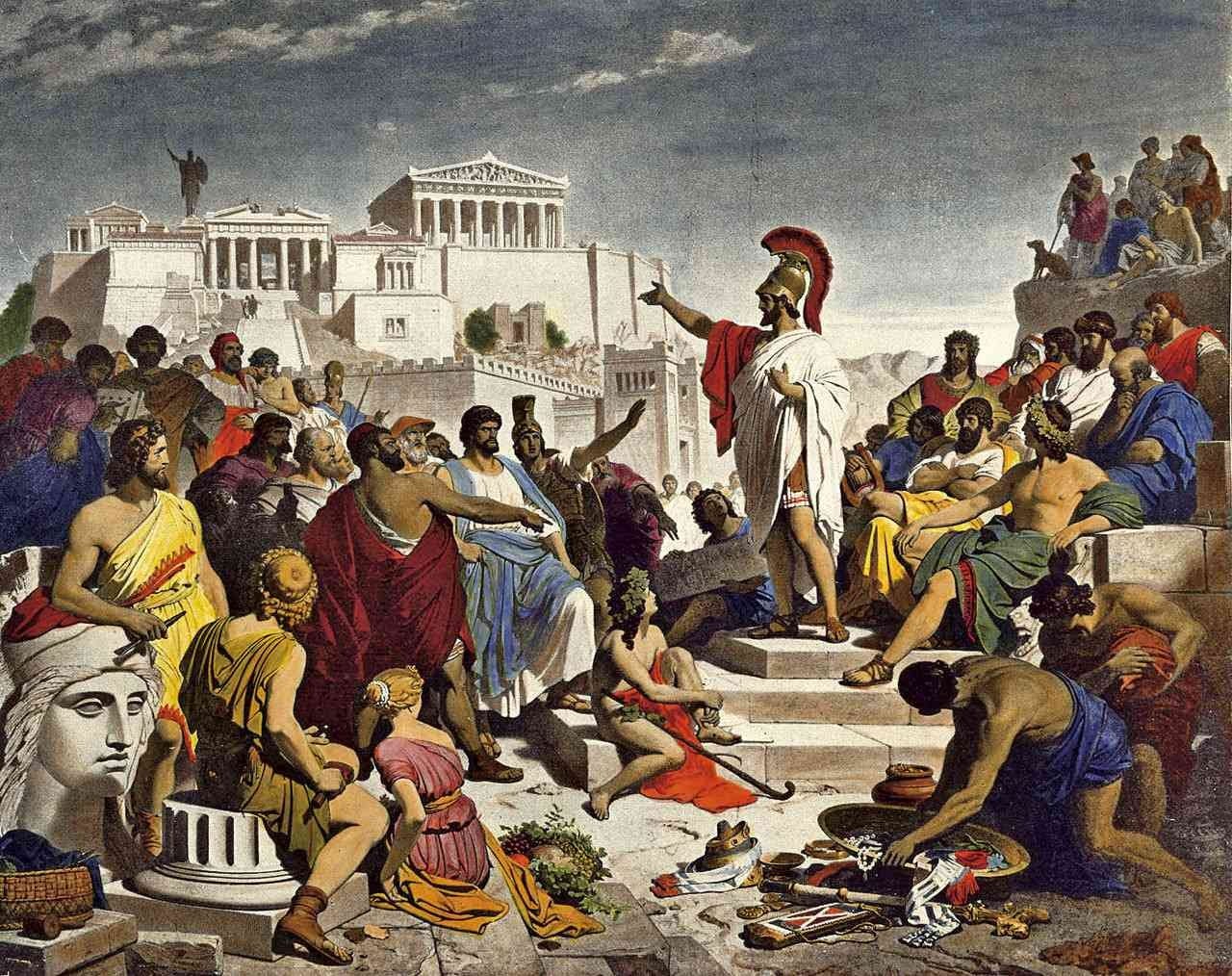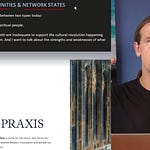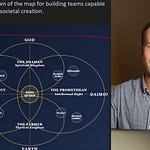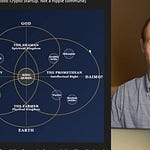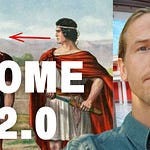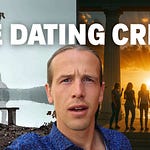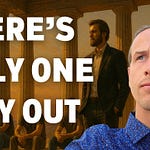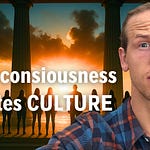This is a lecture about building the cities of the future. More specifically: the core principles behind social cohesion and long-term success - What makes a society actually work? We’ll draw from Ken Wilber, Aristotle, the American Founding Fathers, and good old common sense.
I. Integral Thinking (Ken Wilber)
I was recently talking to my aunt about a woman who became a “trad wife.”
A stay-at-home mom making sourdough and proclaiming how natural it is.
My aunt was disgusted.
“Women telling other women they should be small, and housewives?”
Now personally—I think trad-wiving is mostly a larp. A reactionary response to modern chaos. But I still get it. And I respect the instinct to return to tradition.
But my aunt? She can’t understand anything that looks like it’s restricting a historically oppressed group.
This is the Green Meme—a term from Ken Wilber’s Integral Theory. It’s a stage of psychological development that centers on inclusion, equality, and sensitivity to injustice.
In this worldview:
What’s good? Equality, justice, and compassion for marginalized people.
What’s evil? Hierarchy, exclusivity, or any return to traditional roles.
That lens is valuable. I lived in it. I was once a Marxist too.
But it’s only one layer of truth.
Integral thinking—true higher-order thinking—asks bigger questions.
“What creates the maximum flourishing in society, at every level?”
“How do we transcend and include each stage of development?”
This means including boundaries, hierarchies, tradition, and differentiation—
all of which are seen as evil by the Green Meme. But they are foundational to a healthy society.
II. What Is the State For?
An intelligent person starts by asking the highest question:
What is the purpose of the state?
Plato asked this. So did Aristotle. So did the Founding Fathers. And their answers laid the groundwork for the most successful societies in history. Think of it like designing a ship. You can’t decide on the size or layout without knowing the ship’s purpose.
Is it crossing oceans?
Is it for rivers?
Is it a warship?
Without a clear purpose, every design choice is just guesswork.
Likewise, every political debate is meaningless unless you define what the state is meant to do.
So what is the purpose?
To promote the flourishing of its citizens.
That’s it. That’s the goal.
If a state fails to do that, it’s a failure—period. That brings us to what the classical thinkers got right, and what most modern discourse misses.
III. Civic Virtue & Social Cohesion
Aristotle viewed the state as a partnership for virtue—a collective agreement to promote the good life. Jefferson echoed this, framing it as the state’s duty to protect the natural rights of its people:
Life, liberty, and the pursuit of happiness.
A regime—Athens, America, or anywhere—is simply how a group organizes itself to live well together.
But to hold that together, you need civic virtue.
Civic virtue is when people put we before me.
It’s the glue that holds a republic together.
Every great thinker on politics understood this—Plato, Aristotle, Jefferson, Franklin. And anyone who understands teamwork.
But here’s the truth:
People only act with civic virtue when they feel bonded—
When they share a goal.
When they belong to something sacred.
The more estranged or atomized people feel, the more they revert to self-interest.
Civic virtue dies without social cohesion.
Case Study: The SEAL Team
Take a Navy SEAL. He’ll die for his brothers.
Why? Because of their shared purpose, shared hardship, and group identity.
Now throw that SEAL into a unit of random civilians, a few foreigners, maybe even someone who resents him—
He’ll be confused. Suspicious. He won’t risk his life.
Because the tribal bond is gone.
Social cohesion only works when:
The team shares a goal.
Outsiders must earn their way in.
And the internal culture is strong and sacred.
If not, the team resents outsiders. The mission collapses.
Same with your business. You wouldn’t let just anyone into your company.
Not even if they went to Harvard.
You’d want people who:
Share the vision
Elevate the team
Take the mission personally
This is obvious on the small scale. But many “green-memers” ignore it at the national or civilizational level.
IV. The Foundation: Citizenship
So what creates true social cohesion?
Citizenship.
Not in the modern bureaucratic sense. But in the ancient sense:
A citizen is someone with a real stake in the long-term project.
For Aristotle, citizenship wasn’t for everyone.
It was for people who participated in political life—especially landowners.
Ownership is everything.
When you don’t own land, don’t see your family’s future in the community, and don’t feel pride in your town—
you’ll disengage.
Renters don’t maintain their yards.
Employees don’t go the extra mile without a stake.
And disconnected people don’t vote or lead well.
Ownership aligns self-interest with group interest.
This is why ancient citizens were landowners.
They cared. They showed up.
They governed themselves, in ways far more direct than modern voting.
Even if they disagreed, they felt personally responsible for the whole.
And that kind of civic engagement gives men pride, meaning, and clarity.
V. Recap: A Republic Only Works If It’s Bonded
To recap so far:
A republic thrives when people feel bonded and invested.
The more you feel this is your people, your town, your future — the more you give.
And that was the original vision of America: diverse but tightly-knit communities who governed themselves and participated in something greater.
This is the vision behind ReTribalize Projects.
We are filtering the world for high-alignment teammates.
We are building real villages—with our friends.
We are restoring pride in place and people.
“This is our tribe. This is our aim. We go together.”
VI. Community + God = Virtue
The final piece is virtue itself.
There is no better recipe for a healthy tribe than:
A shared spiritual practice
A shared mission
These two things automatically grow virtue.
When you feel connected to a group—and the group depends on you—
you rise.
You grow stronger. You heal. You give more.
Because they need you. And you love them.
In battle. In parenting. In leading.
Honor becomes natural when you have a reputation.
When your tribe watches you. When there is myth, pride, and a sacred aim.
Virtue isn’t a moral code. It’s a by-product of tribal life.
And that’s the final piece that ties this all together.
And if you want to join our noble brotherhood, to meet the best friends of your life and help build what comes next—
Apply to the Men’s Academy:
https://kristianbell.com/mens-academy-apply
We are building the future. Together.



